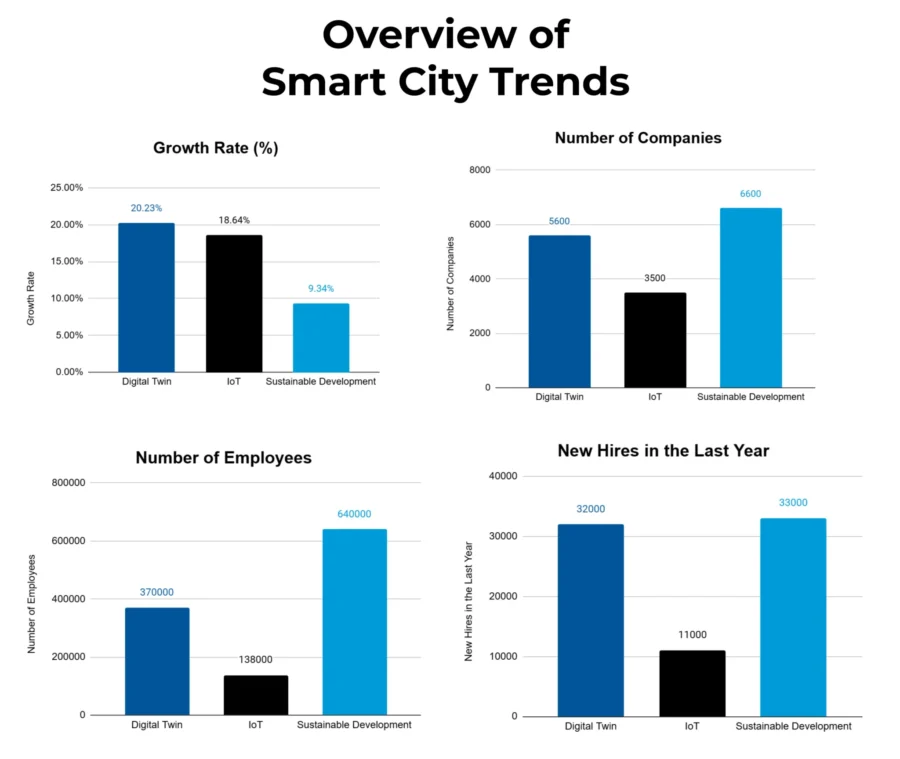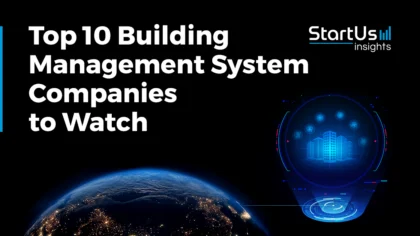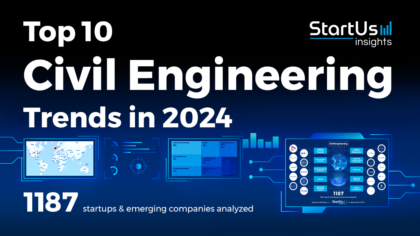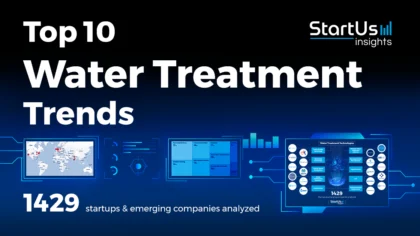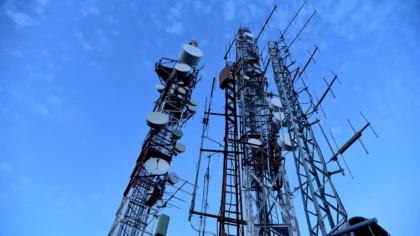The 2025 Smart Cities Market Report explores how IoT, AI, 5G, and green technologies are improving urban centers into sustainable ecosystems. It highlights smart mobility, public-private partnerships, and startups shaping the market and also offers insights for stakeholders on growth and innovation opportunities.
This report was last updated in January 2025.
Executive Summary: Smart City Market Report 2025
- Industry Growth Overview: The smart city market is supporting over 9700 companies and 1K startups. It is projected to grow at a compound annual growth rate of 15.8% from 2025 to 2034, reaching an estimated USD 2.74 trillion by 2034. On a granular level, the market has experienced a growth rate of 24.09% over the past year as per the Discovery Platform’s latest data.
- Manpower & Employment Growth: With over 690K employees globally, the smart city market added 43K employees last year.
- Patents & Grants: The market has secured over 3500 patents and 1090 grants that show support for research, development, and innovation essential for smart city advancements.
- Global Footprint: Major hubs for smart city innovation include the US, India, Germany, France, and Spain. City hubs like London, Singapore, Dubai, Bangalore, and Hong Kong drive key advancements worldwide.
- Investment Landscape: Investments continue to grow, with the average investment round valued at USD 15.1 million. Over 3300 investors have contributed to the market’s progress.
- Top Investors: The major investors, including Standard Chartered, Tencent, and Intesa Sanpaolo, have collectively invested over USD 1 billion.
- Startup Ecosystem: Five innovative startups include GreenMesh (IoT cloud), Ai4SmartCity (AR-based city experiences), Amptricity (energy storage), Neusitz.ch (urban furniture), and GRECiOT (air quality monitoring) that address critical smart city needs.
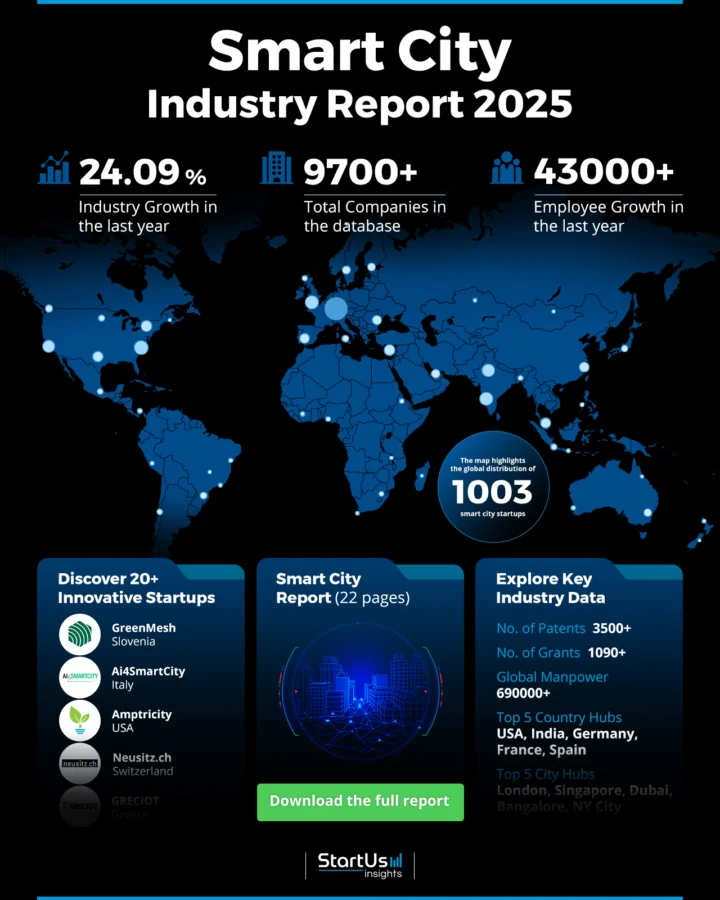
Methodology: How we created this Smart City Market Report
This report is based on proprietary data from our AI-powered StartUs Insights Discovery Platform, which tracks 25 million companies and 20 000 technologies and trends globally, including detailed insights on approximately 5 million startups, scaleups, and tech companies. Leveraging this extensive database, we provide actionable insights on emerging technologies and market trends.
For this report, we focused on the evolution of smart cities over the past 5 years, utilizing our platform’s trend intelligence feature. Key data points analyzed include:
- Total Companies working on the trend
- News Coverage and Annual Growth
- Market Maturity and Patents
- Global Search Volume & Growth
- Funding Activity and Top Countries
- Subtrends within smart city
Our data is refreshed regularly, enabling trend comparisons for deeper insights into their relative impact and importance.
Additionally, we reviewed external resources to supplement our findings with broader market data and predictions, ensuring a reliable and comprehensive overview of the smart city market.
What Data is used to Create this Smart City Report?
Based on the data provided by our Discovery Platform, we observe that the smart city market ranks among the top 5% in the following categories relative to all 20K topics in our database.
These categories provide a comprehensive overview of the market’s key metrics and inform the short-term future direction of the market.
- News Coverage & Publications: The smart city market saw over 9900 publications last year.
- Funding Rounds: With over 4900 funding rounds recorded, the market stands out in investment activity.
- Manpower: Employing more than 690K workers globally, the sector added 43K new employees last year.
- Patents: The smart city market also holds over 3500 patents.
- Grants: It has secured more than 1090 grants, which shows strong support for research and development initiatives.
- Yearly Global Search Growth: The yearly global search growth of 24.31% in the smart city market reflects increasing public interest and market demand.
Explore the Data-driven Smart Cities Outlook for 2025
The Business Research Company predicts that the smart cities market size will grow from USD 949.94 billion in 2025 to USD 1987.43 billion in 2029 with a compound annual growth rate of 20.3%.
The Smart Cities Report 2025 uses data from the Discovery Platform and encapsulates the key metrics that underline the sector’s dynamic growth and innovation.
Our database includes 1K+ startups among over 9700 companies, demonstrating a broad innovation landscape. The smart city market maintains an annual growth rate of 24.09%, supported by over 3500 patents and 1090 grants for research and development.
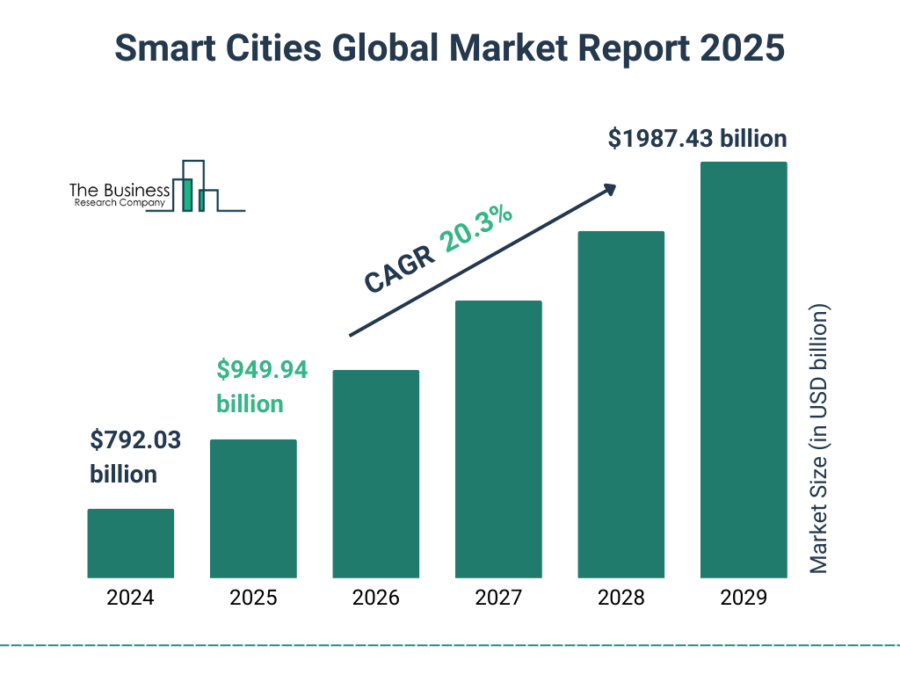
Credit: The Business Research Company
According to Global Market Insights, the smart city market is projected to grow at a compound annual growth rate of 15.8% from 2025 to 2034, reaching an estimated USD 2.74 trillion by 2034.
Another analysis reported the smart city market size at USD 1.14 trillion in 2024, with expectations to grow at a CAGR of 15.3%, reaching USD 4.14 trillion by 2034.
Additionally, the Root Analysis report suggests that the smart cities market size will grow from USD 1 060 billion in 2024 to USD 9 575 billion by 2035, representing a CAGR of 22.14%, during the forecast period 2024-2035.
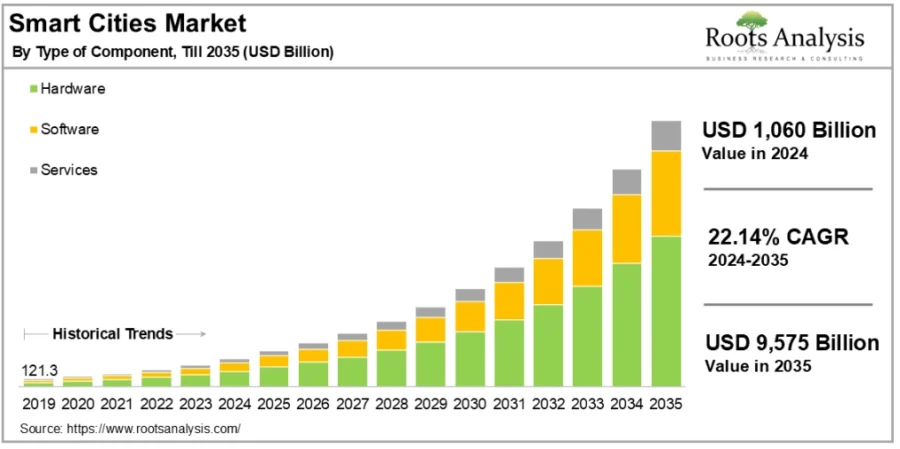
Credit: Root Analysis
China’s Made in China 2025 drives advancements in smart city tech, including high-speed rail, electric vehicles (EVs), and renewable energy.
A Snapshot of the Global Smart City Market
The smart city market continues to develop rapidly, with an annual growth rate of 24.09%. The sector supports 1K+ startups, with over 590 in the early stages. Further, more than 300 companies have undergone mergers and acquisitions.
Further, the global workforce exceeds 690K employees, with 43K added last year. The prominent hubs include the US, India, Germany, France, and Spain, with city hubs in London, Singapore, Dubai, Bangalore, and Hong Kong.
Intellectual property drives innovation, with over 3500 patents registered by more than 850 applicants.
Moreover, the patent activity has grown by 89.38% annually, with China and South Korea emerging as top issuers, accounting for over 1250 and 1200 patents, respectively.
Explore the Funding Landscape of the Smart City Market
Investment in the smart city market remains strong, with an average investment value of USD 15.1 million per funding round. More than 3300 investors have participated in over 4900 funding rounds. These investments have impacted more than 1300 companies and highlight the domain’s ability to attract investor interest and capital.
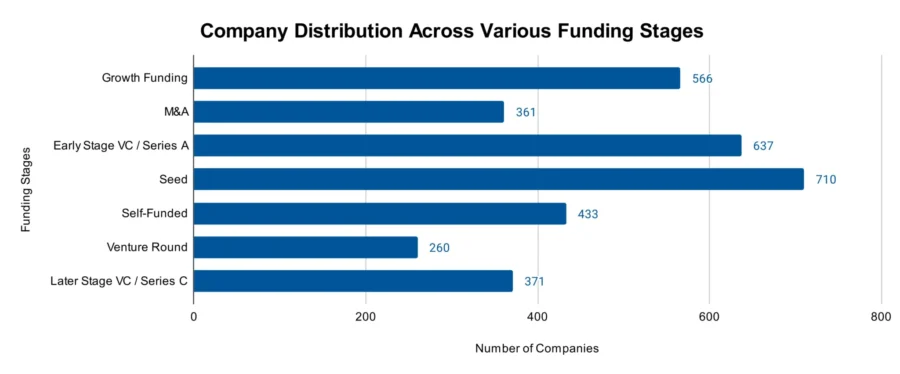
In addition, Toyota is building Woven City, a USD 10 billion smart city near Mount Fuji, featuring robots, self-driving vehicles, and AI-powered homes to welcome residents by the fall of 2025.
Who is Investing in Smart City Solutions?
The top investors in the smart city market have invested over USD 1 billion, showing strong financial commitment to the sector’s growth and innovation.

- Standard Chartered has invested USD 363.3 million across two companies. Standard Chartered partnered with Apollo to accelerate global renewable energy financing with a commitment of USD 3 billion.
- Tencent has allocated USD 288.7 million to two companies.
- Intesa Sanpaolo has distributed USD 263.4 million among the three companies. Intesa Sanpaolo launched “Your Future is Our Business,” pledging USD 123.27 billion to support SMEs, micro-businesses, and supply chains by 2026.
- Credit Agricole has invested USD 132.2 million across four companies. Credit Agricole and the EIB partnered to finance SMEs’ ecological transition, signing USD 1.64 billion agreements for green mobility and climate projects in Europe.
- UniCredit has committed USD 115.6 million to three companies. UniCredit invested in Commerzbank to strengthen its leadership while maintaining a focus on organic growth.
- BPI France has invested in 18 companies, totaling USD 105.1 million.
- Alibaba Group has invested USD 103.3 million across two companies. It also reported USD 33.7 billion in Q3 2024 revenue, a 5% increase, driven by cloud growth in AI products, and repurchased USD 4.1 billion in shares.
- Ant Group has committed USD 93.3 million to two companies.
- Hermitage Capital has allocated USD 71.4 million to two companies. It also joined Kecheng Capital and Redpoint Ventures China in CASOL’s seed funding round.
Top Smart City Innovations & Trends
Explore the emerging trends within the smart city landscape along with the firmographic data:
- Digital Twin solutions are becoming essential for real-time simulation and urban infrastructure management. This trend has over 5600 companies working in this space, supported by more than 370K employees. In the last year, 32K new employees joined. The annual trend growth rate of 20.23% signals increasing adoption of digital twins across industries.
- IoT technologies ensure communication between smart systems and devices. With more than 3500 companies, IoT solutions are key enablers of smart city initiatives. The sector employs over 138K people, with 11K new employees joining last year. The annual trend growth rate of 18.64% reflects the importance of interconnected devices in urban infrastructure.
- Sustainable Development is a guiding framework for balancing economic growth with environmental stewardship in smart cities. Backed by over 6600 companies, this trend focuses on integrating sustainable practices within urban environments. The sector employs more than 640K individuals, with 33K new employees added last year. Although the annual trend growth rate is 9.34%, it continues to play a crucial role in long-term urban planning and environmental conservation.
AI adoption is also accelerating urban productivity and services, while generative AI’s rise demands governance for responsible innovation.
Moreover, the integration of IoT devices is projected to reach 27 billion by 2025 and is pivotal to smart city operations.
5 Top Examples from 1000+ Innovative Smart City Startups
The five innovative startups showcased below are picked based on data including the trend they operate within and their relevance, founding year, funding status, and more. Book a demo to find promising startups, emerging trends, or industry data specific to your company’s needs and objectives.
GreenMesh offers IoT Cloud for Smart Cities
Slovenian startup GreenMesh develops IoT-based solutions for smart cities and industrial automation to offer real-time data management and predictive analytics.
Its Widgelix, a low-code IoT platform, integrates with diverse devices and communication protocols like LoRaWAN. This platform enables businesses and municipalities to connect, manage, and analyze data from various sensors for optimizing resource management and automation across sectors.
Moreover, Widgelix provides tools like data visualization, automated alerts, and a rule engine to streamline IoT workflows and improve decision-making.
Ai4SmartCity provides AR-powered City Experiences
Italian startup Ai4SmartCity delivers modular software solutions for smart cities and public administration services. Its platform integrates AI, augmented reality, and smart interfaces to streamline institutional communication, digitalize public services, and promote cultural and territorial development.
Its key offerings include CMS portals, mobile apps, and AR-enabled tools for tourism and urban management for municipalities and public organizations.
The startup combines AR mobility, online citizen services, and remote work solutions for councils and associations.
Moreover, Ai4SmartCity promotes social innovation by enhancing engagement between citizens and institutions to ensure efficient service delivery and promote sustainable urban development.
Amptricity delivers Sustainable Energy Storage
US-based startup Amptricity offers solid-state energy storage systems (ESS) to improve energy management in residential, commercial, and industrial sectors.
Its batteries use solid electrodes and electrolytes to eliminate risks like thermal runaway and toxicity associated with traditional lithium-ion batteries.
These systems provide high energy density, support simultaneous charging and discharging, and operate efficiently in temperatures ranging from -40 to 55 degrees C.
Further, the startup’s solutions enable peak shaving, load shifting, and uninterrupted power during outages, for renewable energy storage and backup power in critical facilities.
Neusitz.ch provides Smart City Urban Furniture
Swiss startup Neusitz.ch provides urban furniture solutions for smart cities, focusing on connected infrastructure and sustainability.
Its products include solar-powered smart benches like the Steora models that combine photovoltaic (PV) modules, Wi-Fi connectivity, and device charging stations via USB and wirelessly.
Additionally, these benches also feature ambient lighting, air cooling systems, and sensors to optimize energy use and enhance user comfort.
With a design that operates autonomously using solar energy, the benches function effectively across varied weather conditions and contribute to greener, more connected urban environments.
GRECiOT enables Air Quality Monitoring
Greek startup GRECiOT develops IoT-based environmental monitoring solutions for indoor and outdoor air quality management.
The startup collaborates with microstations to measure pollutants and provide real-time data via a cloud platform. These solutions use AI and machine learning to identify pollution sources and enable predictive analytics.

Moreover, the startup’s offerings include air quality tools for cities, schools, and industrial sites, to aid organizations monitor environmental conditions, optimizing energy usage, and improving public health.
Gain Comprehensive Insights into Smart City Trends, Startups, or Technologies
The smart city market is set for sustained growth in 2025, driven by technological advancements and increasing urban challenges. Digital twins, IoT solutions, and sustainable development will shape future innovations to increase urban efficiency and environmental resilience. With continued global investment and workforce expansion, the market will play a pivotal role in building smarter, more sustainable cities worldwide.
Get in touch to explore all 1000+ startups and scaleups and all industry trends impacting smart city companies.



